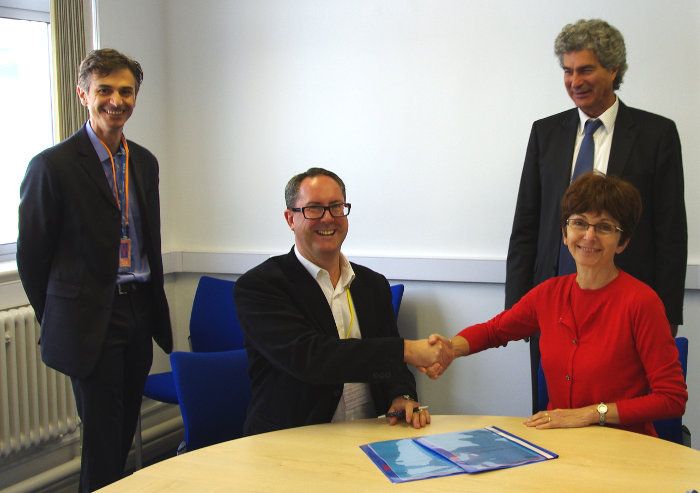
ESA has signed an agreement with the £83 million (€116 million) Seraphim Space & Special Situations Fund to work alongside ESA’s Business Applications programme. The Fund will also back other space-related investment opportunities beyond ESA.
It will be launched later this year to harness the finance, expertise and market access of a range of leading space companies and institutions, helping to accelerate business growth and market opportunities for industry.
The Fund is supported by the UK Space Agency with backing from Thales Alenia Space, Airbus Defence & Space, Telespazio, Com Dev International, Avanti Communications and e2v and a growing list of other leading multinational space companies with combined annual revenues approaching €30 billion.
The concept of creating a partnership between industry, government and academia to develop, grow and exploit new space-related opportunities was conceived as part of the UK’s Space Innovation and Growth Strategy, which started in 2010.
Amnon Ginati, former ESA Head of Integrated Applications, commented, “This initiative demonstrates the usefulness of space infrastructure for European industry and economic growth. The Fund will help us to establish strategic relationships beyond ESA’s conventional boundaries.”
“ESA provides unparalleled access to innovative space-related projects across Europe,” added Mark Boggett, Managing Director at Seraphim Space.
“Seraphim will provide ‘A-series’ risk capital and vital access to a broad range of engaged international space corporates who may become customers, partners, co-investors or even acquirers. We hope to create a virtuous circle to accelerate innovation and growth in the space market.”
Amnon Ginati also remarked, “Our analysis of 168 completed Business Applications projects has shown that 74% demonstrated commercial potential, 54% led to operational services, and 36% are generating revenue. Nine projects received private financing from a variety of investors.”
ESA Business Applications currently oversees 315 projects across a diverse range of sectors such as health, agriculture and forestry, energy, water management, transport, tourism, safety and security, media and broadcasting, and maritime.
About the Seraphim Space & Special Situations Fund

Seraphim Capital is managed by a team of UK-based venture fund partners, with decades of experience investing in early stage technology businesses. The new Fund focuses on the space tech and the broader ‘space enabling’ ecosystem. It will be managed out of the firm’s new East London office and an office in Harwell, the UK space cluster home to around 150 science research organisations and private companies.
The UK space industry is undergoing unprecedented technological change, and the fund’s corporate venture structure will enable these large companies to gain insight into the next wave of emerging technologies, helping them to innovate faster and ultimately bring more value to their customers.
The Seraphim Space Advisory Board consists of senior representatives from a range of space-related companies and agencies: David Williams, CEO at Avanti Communications, is Chairman of the Board; Stuart Martin, CEO of the Satellite Applications Catapult (a UK Space Tech innovation centre); Amnon Ginati, ESA’s Head of Integrated and Telecommunications-related Applications; and intellectual property expert Justin Hill, partner at law firm Olswang.
About ESA Business Applications
ESA Business Applications transforms research and development investment into commercial products that benefit our daily lives. Supported projects combine two or more space assets such as Earth observation, satellite communications, navigation and human spaceflight technologies, together with complementary non-space systems to develop customised, operational services.
It offers varying degrees of support to projects with different levels of commercial maturity. For riskier or more innovative projects, ESA may provide more support. The closer to market, the more industry must co-invest. Businesses within ESA member and cooperating states – whether small or large, new or experienced – can submit proposals.
The programme strongly emphasise sustainable applications and services, where close partnerships with customers and end-users foster new and wider exploitation of existing space capacity and capability.


